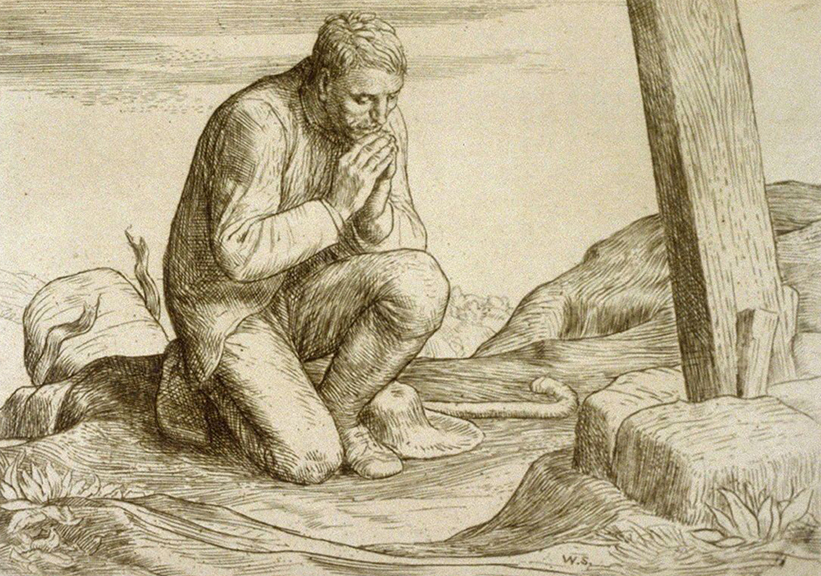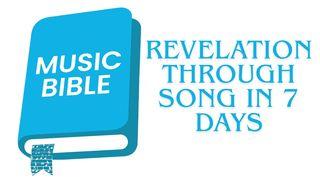Last Words: A Lenten Meditation on the Final Sayings of Christ, Week 3ਨਮੂਨਾ

Come unto Me

Christian Loses His Burden, William Strang, 1895. Etching on paper, 12.6 x 17.3 cm. Achenbach Foundation for Graphic Arts, De Young/Legion of Honor, San Francisco, California. Public Domain.
“Just as I Am” from the album When the Stars Burn Down. Composed by Charlotte Elliott, David Moffitt, Sue C. Smith, Travis Cottrell, and William Batchelder Bradbury. Performed by David Moffitt.
Poetry:
“On Freedom”
by Khalil Gibran
And an orator said, Speak to us of Free-
dom.
And he answered:
At the city gate and by your fireside I
have seen you prostrate yourself and worship
your own freedom,
Even as slaves humble themselves before
a tyrant and praise him though he slays
them.
Ay, in the grove of the temple and in
the shadow of the citadel I have seen the
freest among you wear their freedom as a
yoke and a handcuff.
And my heart bled within me; for you
can only be free when even the desire of
seeking freedom becomes a harness to you,
and when you cease to speak of freedom
as a goal and a fulfillment.
You shall be free indeed when your days
are not without a care nor your nights with-
out a want and a grief,
But rather when these things girdle your
life and yet you rise above them naked and
unbound.
And how shall you rise beyond your
days and nights unless you break the chains
which you at the dawn of your under-
standing have fastened around your noon
hour?
In truth that which you call freedom is
the strongest of these chains, though its
links glitter in the sun and dazzle your eyes.
And what is it but fragments of your own
self you would discard that you may become
free?
If it is an unjust law you would abolish,
that law was written with your own hand
upon your own forehead.
You cannot erase it by burning your law
books nor by washing the foreheads of your
judges, though you pour the sea upon them.
And if it is a despot you would dethrone,
see first that his throne erected within you is
destroyed.
For how can a tyrant rule the free and
the proud, but for a tyranny in their own
freedom and a shame in their own pride?
And if it is a care you would cast off, that
care has been chosen by you rather than
imposed upon you.
And if it is a fear you would dispel, the
seat of that fear is in your heart and not in
the hand of the feared.
Verily all things move within your being
in constant half embrace, the desired and
the dreaded, the repugnant and the cherished,
the pursued and that which you would
escape.
These things move within you as lights
and shadows in pairs that cling.
And when the shadow fades and is no
more, the light that lingers becomes a
shadow to another light.
And thus your freedom when it loses its
fetters becomes itself the fetter of a greater
Freedom.
THE YOKE OF JESUS
When Jesus says, “Come unto me all who are weary and heavy laden and I will give you rest,” it’s easy to see how being freed from a heavy burden would bring rest. After Bunyan’s pilgrim saw the burden of his sin tumble downhill into a tomb, he was “glad and lightsome, and said with a merry heart, ‘He hath given me rest by His sorrow; and life by His death.’” What Jesus says next is harder to understand (and Bunyan doesn’t try to portray it): rest comes from bearing his burden and taking up his yoke.
The book of Jeremiah shows how those who refuse God’s yoke cannot enter his rest. When Jesus said, “take my yoke upon you...and you will find rest for your souls,” he was echoing the words of Jeremiah: “'Thus says the Lord: Look…where the good way is and walk in it…and find rest for your souls.' But they said: 'We will not walk in it.'” (Jer. 6:16). The people in Jeremiah’s day did not find “rest for their souls” because they refused to seek out the way of the Lord, which Jeremiah pictured as a yoke: “They do not know the way of the Lord…they all alike had broken the yoke” (Jer. 5:4-3).
What it looks like to break God’s yoke rather than bear it is vividly portrayed in Jeremiah’s encounter with the false prophet Hananiah. God had instructed Jeremiah to make a wooden yoke, put it on his neck, and say to the leaders of Judah, “Bring your necks under the yoke of the king of Babylon and serve him…and you will live” (Jer. 27:12). Hananiah came and publicly broke Jeremiah’s yoke and prophesied that the exile would only last two years. This flatly contradicted Jeremiah’s main message that God was bringing his people into exile for seventy years because of their sin. So, God sent Jeremiah to tell Hananiah that although he had broken the wooden yoke, God would make a yoke of iron; the exile would be long and Hananiah would die.
The contrast between the wooden yoke and the iron yoke helps explain what Jesus means by calling his yoke “easy.” It’s easier than the alternative. However, it’s still a yoke. Taking it up involves accepting God’s judgment on our sin and following his way rather than our own.
As in Jeremiah’s time, many in the time of Jesus refused to take up his yoke. One of these was the man crucified with Jesus who said “Are you not the Christ? Save yourself and us.” Like others, he expected that the Messiah would save the Jewish people from the Romans. Jesus, however, like Jeremiah before him, prophesied the destruction of Jerusalem as God’s judgment on his people’s sin. One could enter the kingdom he promised only by acknowledging sin and accepting the consequences. The other man crucified with Christ said, “We are indeed justly under the sentence of condemnation, for we are receiving the due reward for our deeds.” Although he expected to die for his sins, he believed that the sinless Messiah would defeat death and set up his eternal kingdom.
Those who come to Jesus for rest must take up his yoke. Those who follow him must take up his cross. The cross means death, but those who submit to it will wake in paradise.
Prayer:
O Lamb of God, who takes away the sin of the world, I come to thee.
Amen
Dr. Joe Henderson
Associate Professor of the Old Testament
Torrey Honors College
Biola University
ਪਵਿੱਤਰ ਸ਼ਾਸਤਰ
About this Plan

The Lent Project is an initiative of Biola University's Center for Christianity, Culture and the Arts. Each daily devotion includes a portion of Scripture, a devotional, a prayer, a work of visual art or a video, a piece of music, and a poem plus brief commentaries on the artworks and artists. The Seven Last Words of Christ refers to the seven short phrases uttered by Jesus on the cross, as gathered from the four Christian gospels. This devotional project connects word, image, voice and song into daily meditations on these words.
More
Related Plans

Revelation Through Song in 7 Days

Choosing Wisdom

5 Marriage Resolutions You Can Actually Keep This Year

The Christmas Story: God's Greatest Gift

INVITING JESUS INTO the MESS

21 Days of Prayer & Fasting

How to Make Home for the Holidays Happier

New Year, New Me, Same God: Walking With God Into the New Year

Breaking Free From Labels & Finding Identity in Christ
